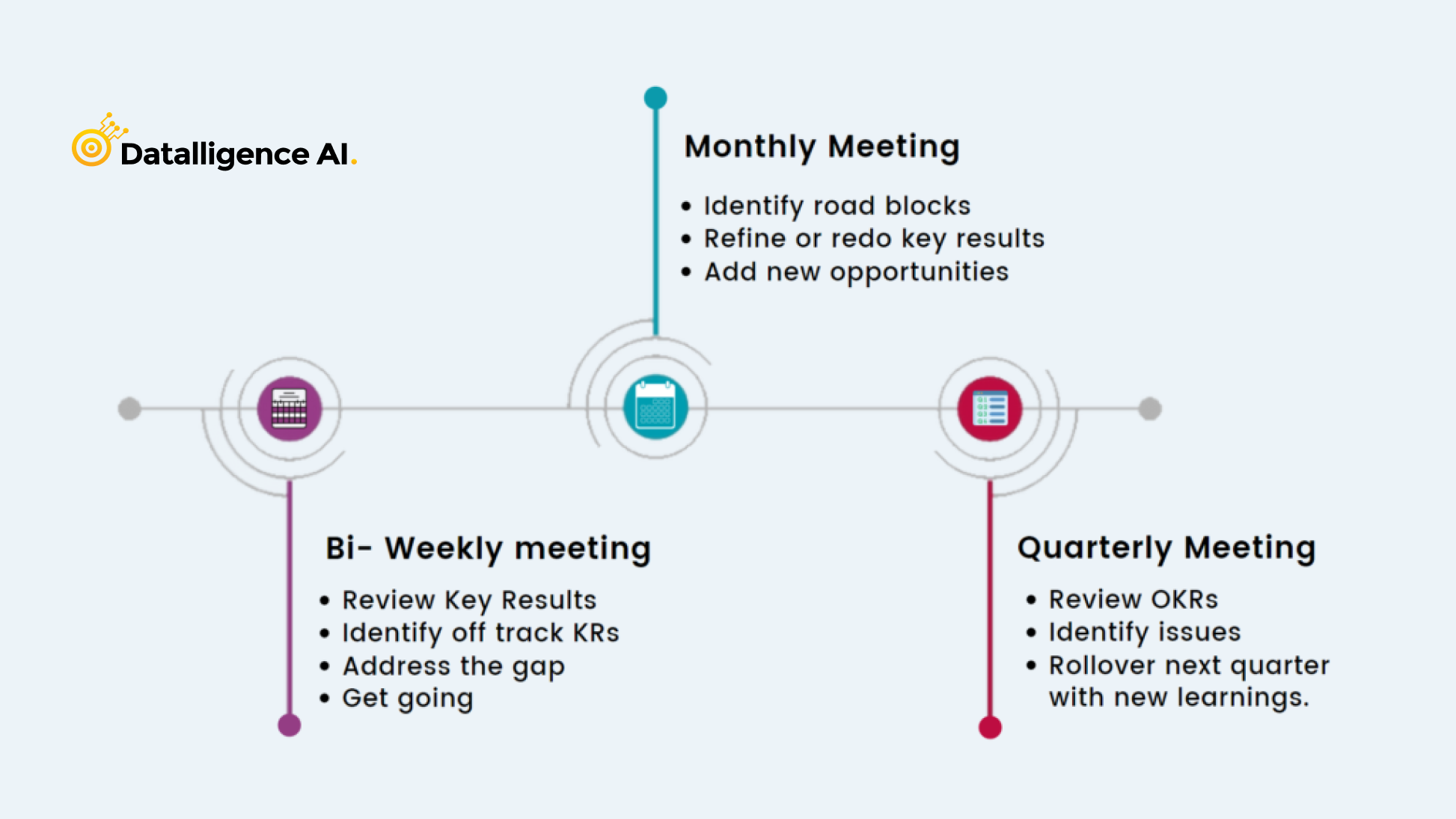How to Conduct Focused and Productive OKR Weekly Review Meetings?
Big or small, every business needs objective goals to measure its success and growth. Having ROIs on track, or making annual profits, or expanding product/service offerings alone does not provide a comprehensive view of business growth/success. You need to set and implement holistic strategic business goals that give you an objective measure of success or growth.
That steers us to OKRs. OKR stands for Objectives and Key Results. OKR is an agile framework that is used for setting and implementing strategic goals. OKR reviews help align the vision and mission of the company with the operational business. Continuous improvement of business is possible by conducting focused and effective OKR review meetings.
Need for OKR Review Meetings
OKRs can be considered as a framework for formulating the qualitative and quantitative key results that help measure the achievement of the objective. Why do businesses require OKRs? We can give you several reasons why OKR Review meetings are a must for every organization.
- A very popular and effective method of goal setting and driving accountability across the organization.
- Can be used as a framework to drive organizational growth, learning, and agility. Driving agility is derived from the management cycle of revising results and refreshing goals every quarter.
- Serves as a strategic link between the vision and mission of the company with the business operations.
- Can be used as a powerful tool for performance management.
The time interval between OKR Review meetings varies as per organizational need. The best way to plan this interval is to sync it with the management rhythm, market dynamics, and organizational pace. Here are common increments of OKR review conferences:

- Weekly Updates: Weekly OKR meetings or OKR weekly check-ins are the shortest periods. Rather than conducting an exclusive weekly OKR, it is recommended to integrate it with the weekly project or tactical meetings. These meetings can effectively plan the priorities, activities, and goals that the team needs to achieve within the next 5-7 days.
- Monthly Check-in: Monthly OKR reviews are built around the specific purpose of reviewing the performance of the OKRs and identifying and addressing any critical actions that need to be addressed in the next 30 days.
- Quarterly Review: OKR quarterly reviews aim at the review of performance and articulate the focus for the next 90 days. Quarterly reviews are needed to ensure focus on quarterly, annual, and long-term business goals.
- Annual OKR review: Annual review meetings look back on business performance over the past year and articulate the focus for the next 12 months.
Irrespective of the type of OKR review meeting interval you follow, the important point to bear in mind is to maintain the rhythm.
How to Run OKR Weekly Review Meetings?
The frequency and agenda of meetings are important factors that determine the productivity of OKR review meetings. How do you run an OKR meeting? The best practice for team meetings is that you run weekly OKR meetings that are structured off of the team’s objectives and key results. However, the frequency of OKR review meetings can be decided based on the individual company’s requirements and mode of operations.
The first and most important step is to ensure members do an OKR check-in before the meeting to update their progress. The best time is to get the check-in done at the beginning of the week. At the team level, weekly ORK meetings work well, at the organizational level quarterly or half-yearly meetings may be practical. A quick check-in lasting not more than 20 minutes is ideal for briefing through important points. OKR weekly review meetings can be made very effective by
- Including only the stakeholders in the discussion
- Having a clear OKR meeting agenda or structure limits the discussion to important points
- Ensuring that all stakeholders are aware of the meeting agenda
- Having a moderator to facilitate quick discussions that cover all the topics
- Recording the minutes of the meeting for future reference
Planning an OKR meeting must include a prior review of the team’s objectives and measuring the progress on KRs. The review must be based on team objectives, progress in key areas, and challenges (if any) in achieving objectives.
Making the Most out of OKR Weekly Reviews
A robust OKR platform improves business outcomes by connecting and engaging the team and the organization as a whole. At Datalligence believe in making OKRs simple and achievable. Our OKR Management solution helps you define clear objectives and align them seamlessly with annual organizational goals. Our OKR management platform makes your OKR weekly review meetings more effective than ever before. Get in touch with us today.










